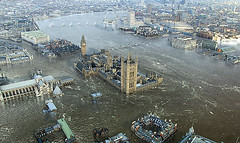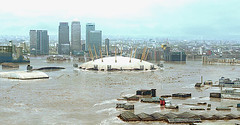I've had an interest in extreme weather events for as long as I can remember. Indeed, I very nearly did a meteorology degree at Southampton University, but had decided that it was just too close to home – only half an hour across the New Forest from where my parents lived. As it was, I opted for a joint geology/chemistry honours degree at Aberystwyth instead, only to find myself transferred to the geology department of the University of Wales, College of Cardiff when Aber's geology department was closed down. Sometimes I wonder what would have happened if I had done meteorology instead.
I've been particularly interested in flooding since reading Richard Doyle's Flood, in which London drowns under 10m of water. It's one of those books where the actual writing style is a bit clich?©d and clunky, and where it would have benefited from being a third of the length, but despite its shortcomings it's a gripping read. Pulp disaster fiction, maybe, but enjoyable stuff.
I had two reactions to Flood when I read it. The first was that I never looked at the London Underground quite the same way again. The second was that I wished I could have adapted it for the big screen. It would be just such a joy to take a book like this, with such potential, and turn it into a first-rate disaster flick.
So it was pretty inevitable that when I saw the headline on the BBC, Review of London's flood defences, that I'd click. Colour me surprised, however, to see this photograph:

Last I looked, London's never been flooded like that!
Turns out to be a still from the forthcoming disaster film… Flood. Fab! It's got Robert Carlyle in the lead, who I love, and Poirot, er, I mean, David Suchet as the Deputy Prime Minister, but what's more, it's being directed by Tony Mitchell. Mitchell also directed Supervolcano, a two part TV 'docu-drama' looking at what would happen if Yellowstone National Park – which is actually what's called a supervolcano – erupted. I rather liked Supervolcano, it seemed to me to be a pretty well thought-through piece of speculative fiction which was grounded in reality and which had paid attention to detail. I can see why someone like Mitchell would be attracted to a story like Flood.
Watching TV last night, I saw a documentary on flooding in the UK, which happened to include interviews both with Richard Doyle and a guy from the Met Office who, surprisingly to me, seemed to be supporting Doyle's point of view that the Thames Barrier is becoming inadequate and that London really could be at risk of a flood event. But according to that wonderfully reliable source of journalistic purity, The Daily Mail, the 'Environment Agency dismissed it as nonsense, saying: “It may make for a good read but it is not good science.'”
The reaction from the Environment Agency, who are responsible for the Thames Barrier, is slightly strange. On their website they say:
Media reactions to the fictional tale are being compared to the hysteria that swept the United States in 1938, when a radio adaptation of HG Wells' War of the Worlds saw Americans gripped by panic at the thought of martian invaders devastating their country.
Really? Where? The press release is dated 1 August, just a few days ago, but I can't say that I've seen any media hysteria over this film. Indeed, I've had to look pretty hard to find any sort of reaction at all in the media, and have found only the stuff on the BBC and The Daily Mail. That's hardly a media frenzy, now, is it? Unless you count the East London Advertiser (nice photos there, by the way).
The Environment Agency then say:
As a result of the interest, Lionsgate and the Environment Agency have resolved to work together to highlight the actions that people can take in the face of real-life flood events and to reassure London of the Thames Barrier’s efficiency.
In reality, a team of Environment Agency engineers and operations staff at the Thames Barrier work continuously to ensure that this type of scenario remains firm fiction, with most recent modelling showing that the Barrier can withstand expected flood pressures for many years to come.
The possibility of London’s defence structures succumbing to a major flood is currently estimated at having a 1:2000 or 0.05 per cent chance of occurring. The last major flood was a 1:300 event in 1953 and it was this event that led to the construction of the Barrier.
Steve East, Thames Barrier technical support team leader said: “The recent flooding and heavy rains in Britain will have made people more aware of the dangers of extreme weather. In fact, our current modelling already takes into account the many different factors that contribute to tidal flooding including weather conditions, fluvial flows and known tidal cycles.
“Even with all of the possible worst case scenario statistics included, our calculations can not be combined to create a wave that could pass over the top of the Thames Barrier. The defences that we have in place can presently cope with the worst that can realistically be thrown at it, but of course it is right that we plan for the future, to ensure that this level of protection is at least maintained in the decades to come. The Thames Barrier protects 125 square km of central London ‚Äì encompassing 1.25 million people and an infrastructure valued at ¬£80bn.”
The Thames Barrier does not stand alone as a defence system – rather it is part of an integrated system of defences stretching from Teddington in west London, to Shoeburyness in the outer estuary. The estuary is also protected by over 300 km of floodwalls, embankments and numerous small gates and barriers. London’s flood defences compare with some of our European neighbours such as Italy where for example, flood protection in Venice is also being designed to 1:1000 year level. Defences in other major cities such as St Petersburg are also designed to the same level.
Producer Justin Bodle said: “The best way to create a programme about an unpredictable scenario like this one is to work with the real-life experts. The Thames Barrier is a structure admired the world over for its efficiency and resilience. Our production may be a work of fiction but it has served to highlight the challenges and investment needed to maintain effective flood management programmes in the UK.”
So the Met Office say on TV that the Barrier is getting on a bit and needs to be reassessed, and the EA are saying that all's well, and Lionsgate will say whatever they've agreed to say. I find it rather disturbing that the EA should react to the release of Flood by immediately going on the defensive, especially when there actually are causes for concern. London is sinking and sea level rising; the Barrier was designed after the 1953 floods and so isn't cutting edge anymore; and a report by the London Assembly's Environment Committee into flooding in the Thames Gateway found 1.25 million people living in areas at risk from flooding, 5% of East London defences in “poor or very poor condition”, and that flood planning is inadequate. I find it even stranger that the EA and Lionsgate should form an agreement to 'work together'. Perhaps it was a condition of their being able to film in the Thames Barrier itself. If so, that's more than a little distasteful to me.
But back to the BBC article that set all this off:
Westminster's head of contingency planning, Brian Blake, said: “Central London is very well protected thanks to the Thames Barrier to the east and Teddington Weir to the west.
“But given the uncertainty created by climate change and the intensity of some of the downpours we've had recently, it is only prudent to review our plans.”
In my opinion, it's only wise to ensure that London's flood defences are up to snuff, but that's something to be determined by the evidence, not through media posturing and press releases. Saying that the Barrier is fine doesn't make it so – I want to see the evidence. Equally, Richard Doyle has done a fair amount of research but he's published only his conclusions, and not his sources, so it's hard to see if he's on the money or grasping at the wrong end of the stick.
Anyway, back to the film. Here's another still I found:

The trailer is on the official Flood site, although I can't find it on YouTube so I can't embed it, sorry.
Unlike The Dreck, sorry, Dark is Rising, I fully expect Flood-the-film to be a good adaptation of Flood-the-book, not necessarily because the source material is as good as Susan Cooper's books, but because I don't see any evidence that Mitchell has messed about with essential elements of the story in the way that Cunningham did. I fully expect Flood-the-movie to be a fun romp, with some great special effect and possibly, even, a better plot than the book, although we'll have to see whether I'm right or not.
Either way, I'm looking forward to seeing it on the big screen!
{ Comments on this entry are closed }




